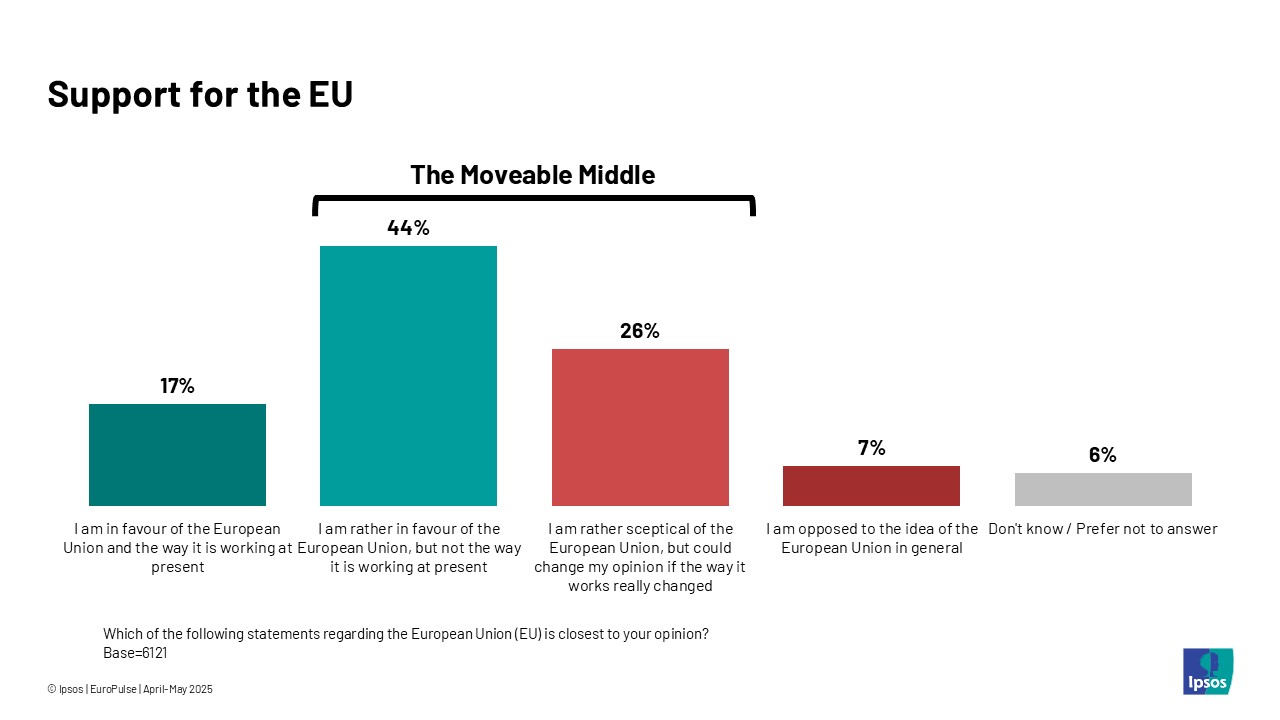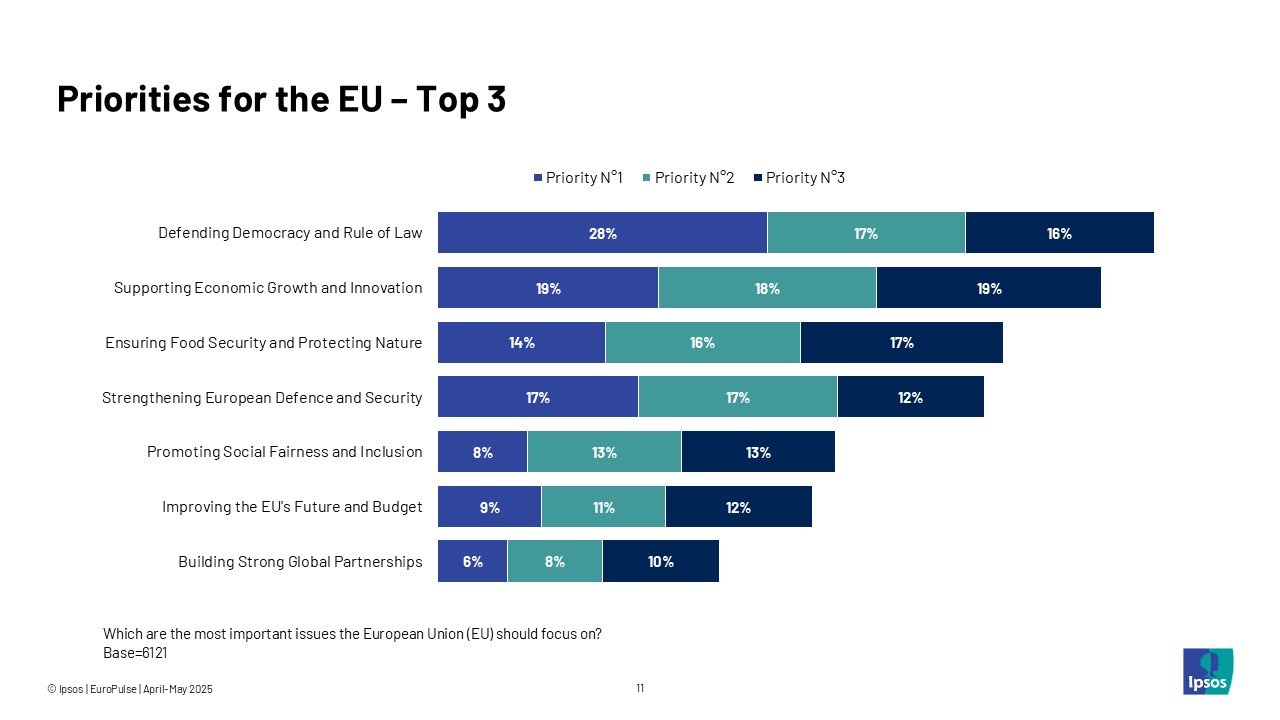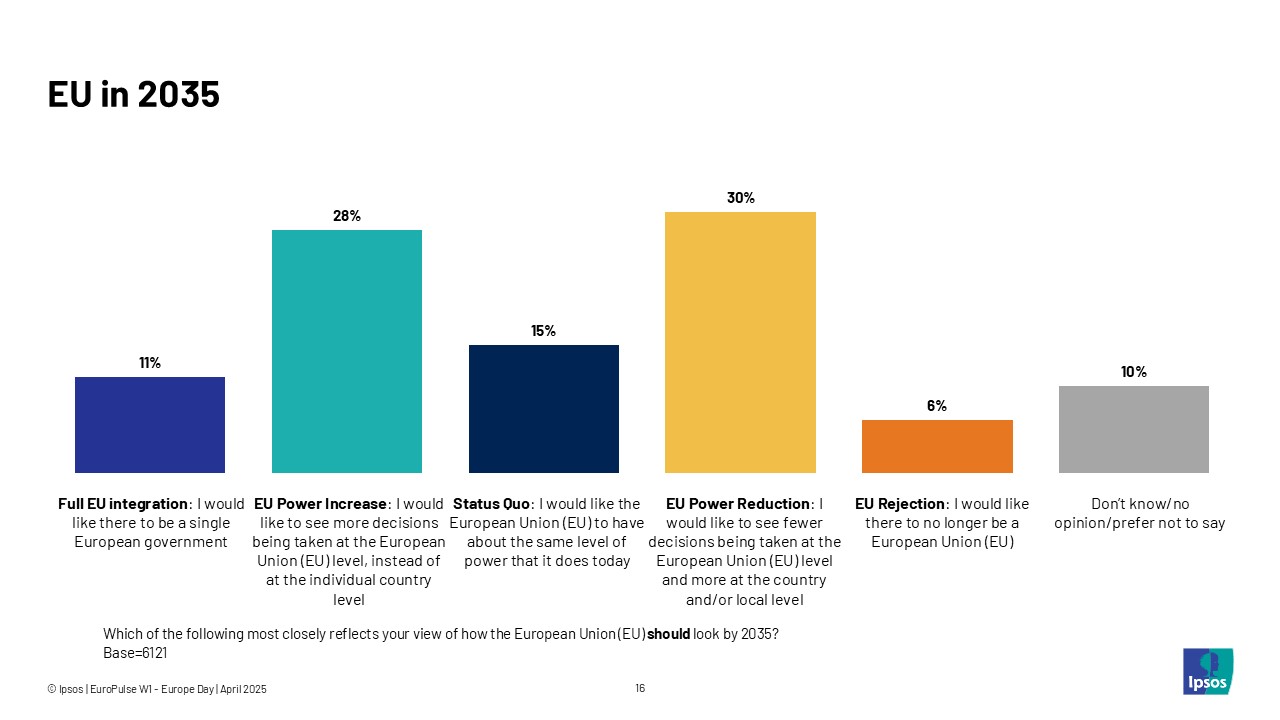Voices of Europe: A Call for Change
After celebrating Europe Day on the 9th of May, we turn our attention to the future of the European Union and its impact on the lives of its citizens. As the EU continues to evolve, understanding public sentiment is more important than ever. Recent data from Ipsos’ EuroPulse (powered by KnowledgePanel) reveals a nuanced picture, offering a valuable opportunity to ensure the Union adapts to meet Europeans’ needs and aspirations.
To secure the EU's future, its leaders must earn trust from the 'Moveable Middle', defend democracy and deliver progress, guided not only by an ideological vision, but by the voices of its people.
- Christine Tresignie, Head of Public Affairs Europe at Ipsos
Winning the trust of the Moveable Middle by Christine Tresignie
Opportunity to persuade The ‘Moveable Middle’

Around one in five Europeans (17%) express full support for the European Union and its current function, while a small minority (7%) are firmly opposed to the EU. Between these two groups lie the 'moveable middle', the 70% of respondents who are either supportive but dissatisfied (44%) or sceptical yet open to change (26%). This large, persuadable segment represents a crucial opportunity for engagement: they care about the EU but seek meaningful reform. To maintain and strengthen public support, the EU must listen to this group’s concerns and demonstrate its ability to evolve, deliver results, and build trust.
What Matters Most to Europeans

The results reveal that defending democracy and the rule of law stands as the foremost priority for Europeans, with 28% ranking it as their top concern and a total of 61% placing it among their top three. This is closely followed by supporting economic growth and innovation, prioritised by 19% as the most important issue and by 56% overall in their top three — highlighting the public's concern for both political integrity and economic resilience.
Not far behind, environmental protection and food security (47% include this among their top three priorities) and European defence and security (46% ) emerge as shared secondary priorities, reflecting citizens' dual concern for planetary and personal safety. Issues such as social fairness and inclusion (34%), EU governance and budgeting (32%), and global partnerships (24%) appear less urgent in the public mind, though are still valued.
These insights suggest that to meet public expectations, the EU must focus on a tripartite agenda: safeguarding democracy, strengthening the economy, and ensuring both environmental and physical security.
Competing Visions for 2035

Public views on the future of the European Union illustrate a landscape shaped by a desire for both reform and ambition. The most supported vision is EU Power Reduction (30%), indicating a strong preference for decentralisation and more national or local decision-making. Close behind, however, is EU Power Increase (28%), showing that nearly as many citizens envision a stronger and more centralised EU.
A smaller segment prefers the Status Quo (15%), while 11% advocate for Full EU Integration through a single European government. Only 6% support EU Rejection, confirming that outright opposition remains limited.
These results highlight a diverse but engaged public, with a significant portion split between those seeking a more national-centered EU and those favouring deeper integration. This underscores the importance of flexibility, responsiveness, and inclusive dialogue in shaping the EU’s evolution toward 2035.
Winning the trust of the 'Moveable Middle'
By Christine Tresignie
Looking at the EuroPulse results, one thing stands out: most people are not against the EU, but they are not unequivocally supportive either. They are somewhere in the middle, hopeful but frustrated. Both numerically and substantively his group the most important. They care. They’re paying attention. And they’re asking for change.
This 'Moveable Middle' is where the future of the EU will be decided. To move forward, the EU needs to listen to them and act on what matters most to them. Here’s what that could look like:
- Talk to people who want change. Don’t ignore the quiet majority. Reach out, ask questions, and follow through.
- Keep promoting the EU values. Democracy, rule of law, personal and environmental security aren’t abstract, they’re what people care about.
- Show real results. Whether it’s jobs, climate, or food security, people want to see action, not just plans.
- Keep the conversation going. People want a say in where the EU is headed. The EU should make space for that, every step of the way.
The data tells us a lot, but more than that, it reminds us that trust is not built with plans or reports. It is built with action and honest connection. That is the kind of EU people are asking for.



